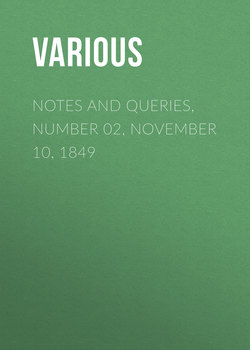Читать книгу Notes and Queries, Number 02, November 10, 1849 - Various - Страница 3
BISHOP AYLMER'S LETTER, AND THE POEM ON THE ARMADA
ОглавлениеAs I am in a condition to answer the inquiry of your "Hearty Well-wisher," on p. 12 of your last Number of "NOTES AND QUERIES," I proceed to give him the information he asks. I shall be happy if what follows is of any use to your correspondent, taking it for granted that he is as zealous for your success as his signature indicates.
The "foolish rhyme," to which the attention of the Bishop of London had been directed by Lord Burghley, has the subsequent doggrel title:—
"A Skeltonicall Salvtation,
Or condigne gratvlation,
And iust vexation
Of the Spanishe nation,
That in a bravado
Spent many a crvsado,
In setting forth an armado
England to invado."
This is as the title stands in the Oxford impression (of which I never saw more than one copy, because, we may presume, it was suppressed by the authorities of the University), and the following is the imprint at the bottom of it:—"Printed at Oxford by Ioseph Barnes, and are to bee sold in Paules Churchyard, at the signe of the Tygres head, 1589."
There exists several exemplars of the London edition—"Imprinted at London for Toby Cooke, 1589,"—the title-page of which, as well as the rest of the poem, differs only literally from that of Oxford, excepting that to the latter is appended a Latin version, also in rhyme, and in close imitation of the English. I subjoin a brief specimen of it:—
"Qui regis Hispanos,
Superbos et vanos,
Crudeles et insanos,
Multùm aberrasti,
Cùm tuos animasti,
Et bellum inchoasti
Contra Anglos animosos,
Fortes et bellicosos,
Nobiles et generosos.
Qui te excitavit
Proculdubio deliravit
Et te fascinavit," &c.
The whole production consists only of ten leaves, 4to., and the Latin portion, which has the subsequent separate title-page, occupies four of them:—
"AD REGEM
HISPANVM.
Cum tua non fuerint heroica facta, Philippe,
Risu digna cano carmine ridiculo."
I shall not here introduce any part of the English version, because one or two long quotations will be found in the introductory portion of the Rev. A. Dyce's excellent edition of Skelton's Works (2 vols. 8vo. 1843). Respecting the Latin portion I have been more particular, because the learned editor was not aware that the production had come from the press of Barnes of Oxford, nor that a Latin version was appended to it.
I may take the liberty of adding here a mention of Skelton which escaped notice, and which is from one of the tracts against Thomas Nash, produced by Gabriel Harvey, the friend of Spenser. He couples Skelton and Scoggin together, in no very respectful manner, and completes the triumvirate by Nash, whom he here calls Signor Capriccio:—"And what riott so pestiferous as that which in sugred baites presenteth most poisonous hookes? Sir Skelton and Master Scoggin were but innocents to Signior Capricio."
This quotation is the more noticeable, because it recognises the sacred character of Skelton (however unworthy of the gown) in the prefix "Sir," which, as most people are aware, was then generally given to clergymen: Scoggin, on the other hand, is only styled "Master Scoggin."
J. PAYNE COLLIER.
[The preceding communication was already in type when we received the following from Mr. Bolton Corney, which we gladly print, inasmuch as it illustrates some points not touched upon by Mr. Collier.]
